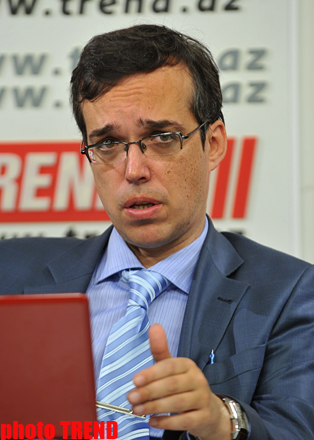Azerbaijan, Baku, Jan. 21 / Trend E. Tariverdiyeva /
There is certain pause after the OSCE summit on the settlement of Armenian-Azerbaijani conflict over Nagorno-Karabakh.
This pause should be filled. The format of further activity of mediators in resolving the territorial dispute must be determined, Trend Expert Council member, Chief Editor of the Russian analytical agency Vestnik Kavkaza and Moscow State University History Department Deputy Dean Alexei Vlasov said.
"I think now it is the time of crystallizing the plans for the coming year. There is reason to believe that Moscow will not leave its efforts as the main moderator of this bilateral dialogue. Everything will be clear on Jan. 24," Vlasov told Trend over the phone from Astana.
The meeting of Foreign Ministers of Azerbaijan, Armenia and Russia - Elmar Mammadyarov, Sergey Lavrov, Edward Nalbandian, respectively, was scheduled for Jan. 24 in Moscow, Armenian Foreign Minister told media, the Novosti-Armenia agency reported.
He said that a meeting was initiated by Russian Foreign Minister Sergey Lavrov.
The foreign ministers of Russia, Armenia and Azerbaijan met in Moscow last November. They discussed the issue of the Nagorno-Karabakh conflict.
The conflict between the two South Caucasus countries began in 1988 when Armenia made territorial claims against Azerbaijan. Armenian armed forces have occupied 20 percent of Azerbaijan since 1992, including the Nagorno-Karabakh region and 7 surrounding districts.
Azerbaijan and Armenia signed a ceasefire agreement in 1994. The co-chairs of the OSCE Minsk Group - Russia, France, and the United States - are currently holding the peace negotiations.
Armenia has not yet implemented the U.N. Security Council's four resolutions on the liberation of the Nagorno-Karabakh and surrounding regions.
Vlasov said that Russia is not going to leave the topic of the Nagorno-Karabakh settlement. However, perhaps this issue will be included in the general context of resolving the situation in South Caucasus.
"This will be done to control the activity of international organizations in the region. It is such an integrated approach that helps Moscow to hold status of the main moderator from the one hand, on the Nagorno-Karabakh, on the other hand, to avoid excessive activation of the international organizations on the Georgian dossier," Vlasov said.
Military actions were launched in the unrecognized republic of South Ossetia in August 2008. Georgian troops entered Tskhinvali, the capital of South Ossetia and later Russian troops occupied the city and drove the Georgian military back to Georgia. Russia recognized the independence of Abkhazia and South Ossetia on Aug. 26 and established diplomatic relations with them on Sept. 9, 2008.
He said that Moscow will not slow down the tempo it reached in resolving the Nagorno-Karabakh conflict in 2010.
It is difficult to expect any radical changes following a meeting of foreign ministers on Jan. 24. But after this meeting, the specific content may appear and fill the pause after the Astana summit.
The summit, held in Astana on Dec. 1-2, brought together presidents and prime ministers from 56 OSCE member countries and 12 OSCE partner countries, as well as the heads of 68 international organizations. A final declaration was adopted for the first time within 11 years.
A joint statement by the presidents of countries - parties to the conflict, Armenia and Azerbaijan, as well as the heads of delegations of the OSCE Minsk Group, was adopted during the summit. The statement reflects the call for a speedy settlement of Armenian-Azerbaijani conflict over Nagorno-Karabakh.






